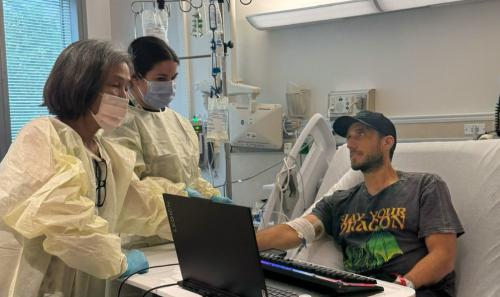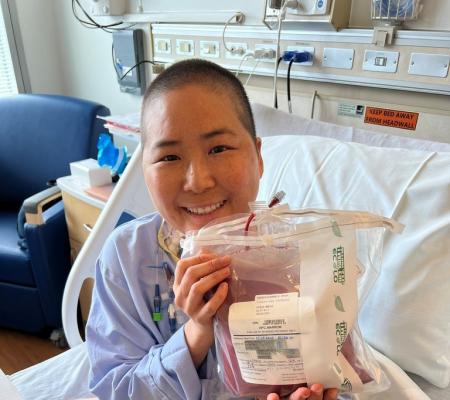
-
Understanding primary immunodeficiency (PI)

Understanding PI
The more you understand about primary immunodeficiency (PI), the better you can live with the disease or support others in your life with PI. Learn more about PI, including the various diagnoses and treatment options.
-
Living with PI
-
Addressing mental health
-
Explaining your diagnosis
- General care
- Get support
- For parents and guardians
-
Managing workplace issues
- Navigating insurance
-
Traveling safely

Living with PI
Living with primary immunodeficiency (PI) can be challenging, but you’re not alone—many people with PI lead full and active lives. With the right support and resources, you can, too.
-
Addressing mental health
-
Get involved

Get involved
Be a hero for those with PI. Change lives by promoting primary immunodeficiency (PI) awareness and taking action in your community through advocacy, donating, volunteering, or fundraising.
-
Advancing research and clinical care
-
Research Grant Program
-
Consulting immunologist
-
Diagnosing PI
-
Getting prior authorization
-
Clinician education
-
Survey research
-
Participating in clinical trials

Advancing research and clinical care
Whether you’re a clinician, researcher, or an individual with primary immunodeficiency (PI), IDF has resources to help you advance the field. Get details on surveys, grants, and clinical trials.
-
Research Grant Program

In the chronic granulomatous disease (CGD) community, no two families are alike. Many individuals are doing unique things and living interesting, active lives. CGD does not hold them back. Angela Pauling of Rochester, NY, and her son Alistair, are no exceptions to this rule.
Angela has a background in wellness, so she has a proactive, balanced approach to caring for her son while managing CGD with standard treatments, including antibacterial and antifungal prophylaxis, as well as interferon gamma.
Alistair was diagnosed with CGD at six months old, after a spate of fevers, blood in his stool, and a harrowing fungal infection in his left lung. The latter required a lung biopsy and a feeding tube. Since he was just learning to try solid foods, the feeding tube pushed back his development in this area and resulted in an eating disorder that he still has today. In addition, like many patients with CGD, Alistair has gastrointestinal (GI) issues, related to Crohn's disease. This means Angela needs to be mindful of his diet to avoid chronic inflammation. To manage this common side effect of CGD, Alistair takes azathioprine. Thankfully, Angela's wellness background enables her to ensure he is eating healthy foods while avoiding heavily processed items, dairy, and sugar.
In terms of his daily life, Alistair enjoys attending fifth grade, and when he is not in school, he partakes in outdoor activities that are typical for an upstate New Yorker, where snow is plentiful in the winter and green spaces abound in the summer. He enjoys skiing during the cold months and running in 5K races when the warm weather allows.
If Alistair sounds like he is living well with CGD, that’s because he is. He has not had a serious infection in three years, and Angela is not considering a bone marrow transplant for him at this time.
"CGD is all we know, and we are used to it," said Angela. "At this point, we are really hoping that gene therapy will provide a safer option."
In the meantime, she offers the following piece of advice to parents of a child with CGD, "What works best for me is to ensure that I'm always surrounded by a supportive community," said Angela. "Whether it's people who can step in when I don't have the energy or just someone I can vent to. That's the glue that holds it all together."
She acknowledges that it's hard not to feel isolated with a rare disease like CGD, but IDF has helped in this area too.
"We've gone to the IDF National Conferences in New Orleans and California," said Angela. "That's where we get to meet families and children who are Alistair's age with CGD. We listen to their stories, and we hear that they're going through the same things we are. Then, we don't feel so alone. That's good for Alistair and me."
Thank you to the Pauling Family for sharing their story!
Related resources

Man with X-linked hyper IgM first-ever to receive novel gene therapy

Pharmacist with CVID receives bone marrow transplant

Undiagnosed: Reuben & Sherri Johnson on CGD, chronic illness, and the fight for healthcare
Sign up for updates from IDF
Receive news and helpful resources to your cell phone or inbox. You can change or cancel your subscription at any time.





The Immune Deficiency Foundation improves the diagnosis, treatment, and quality of life for every person affected by primary immunodeficiency.
We foster a community that is connected, engaged, and empowered through advocacy, education, and research.
Combined Charity Campaign | CFC# 66309

